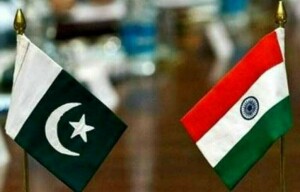UN Urges Restraint Amid Escalating Tensions Between India and Pakistan
NEW DELHI: Following a deadly shooting incident in Pahalgam, Indian Illegally Occupied Jammu and Kashmir (IIOJK), the United Nations (UN) has called upon India and Pakistan to exercise “maximum restraint” as both nations implement reciprocal diplomatic measures.
Relations between the two countries have deteriorated to a new low. India has accused Pakistan of backing “cross-border terrorism” following an attack by gunmen targeting civilians in the contested Muslim-majority region of IIOJK, marking the most severe incident of its kind in 25 years.
UN spokesman Stephane Dujarric stated to reporters in New York on Thursday, “We strongly encourage both governments to exercise the utmost restraint and ensure that the current situation does not escalate further.”
He further added, “We believe that any issues between Pakistan and India can and should be resolved peacefully through constructive mutual dialogue.”
Indian Prime Minister Narendra Modi pledged on Thursday to pursue the gunmen responsible for the deaths of 26 civilians at the popular tourist destination of Pahalgam. Indian police have identified two of the three alleged gunmen as Pakistani nationals.
“I declare to the world: India will identify, pursue, and penalize every terrorist and their supporters,” Modi asserted in his first address since Tuesday’s attack in the Himalayan region. “We will pursue them to the ends of the Earth.”
Islamabad refuted any involvement, dismissing attempts to link Pakistan to the Pahalgam attack as “baseless” and promising to respond to any Indian action.
Following a rare National Security Committee meeting with top military officials, a Pakistani statement declared, “Any threat to Pakistan’s sovereignty and the security of its citizens will be met with strong retaliatory measures across all domains.” Pakistan Prime Minister Shehbaz Sharif held the meeting.
Kashmir has remained divided between India and Pakistan since their independence in 1947.
On Thursday, the Indian air force and navy both conducted military exercises.
Indian police are claiming that the three gunmen are members of the Lashkar-e-Taiba group, which is based in Pakistan.
An official from Pakistan reported an exchange of fire at the border with India overnight.
A reward of two million rupees ($23,500) has been offered for information leading to the arrest of each man.
Following the attack, New Delhi suspended a water-sharing agreement, announced the closure of the primary land border crossing with Pakistan, reduced diplomatic ties, and revoked visas for Pakistani citizens.
In response, Islamabad ordered the expulsion of Indian diplomats and military advisers, cancelled visas for Indian nationals—excluding Sikh pilgrims—and closed the main border crossing from its side on Thursday.
Pakistan also cautioned that any attempt by India to halt the water supply from the Indus River would be considered an “act of war.”
‘Reduce it to dust’
The Pahalgam attack represents a notable change in the tactics of Kashmiri fighters, who typically target Indian security forces.
Experts suggest a military response may be forthcoming, with some predicting it could occur within days, while others suggest weeks.
In 2019, a suicide attack resulted in the deaths of 41 Indian troops in Kashmir, leading to Indian air strikes inside Pakistan and bringing the two nations to the brink of war.
“Whatever little territory these terrorists possess, it is time to obliterate it,” Modi stated on Thursday, following two minutes of silence for the victims, almost all of whom were Indian.
India has historically taken time to respond to previous attacks.
The most significant attack in recent years in IIOJK occurred in Pulwama in 2019.
Twelve days later, Indian fighter jets launched air strikes on Pakistani territory.
Indian security forces have initiated a large-scale manhunt for the Pahalgam attackers, resulting in numerous detentions.
The attack has sparked outrage among Hindu nationalist groups, and students from IIOJK attending institutions across India have reported experiencing harassment and intimidation.



Comments (0)
No comments yet. Be the first to comment!
Leave a Comment